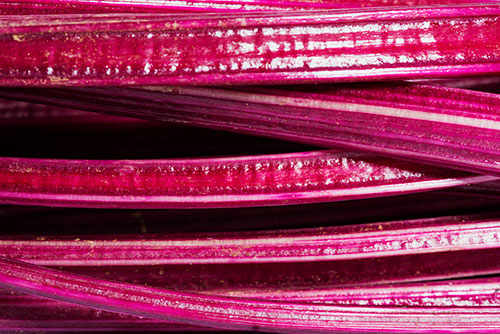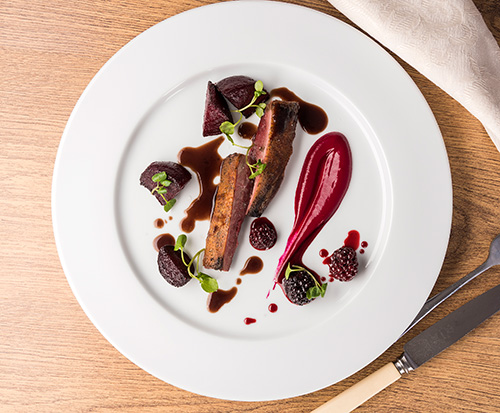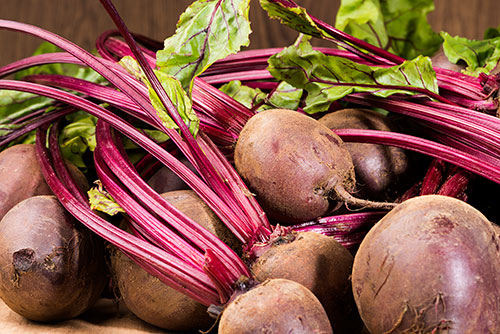Home-grown harvest: Beetroot
The jewel-like colours and intense flavour of beetroot make it particularly suitable for an autumnal feast, says chef-consultant Russell Brown
Whether it's dark ruby red, golden yellow or eye-catching pink and white swirled candy stripe, beetroot gives plenty of options across a relatively long season. Vacuum packs of cooked beetroot or jars of pickled beets may have their place, but the real interest for the chef lies in the raw product. The taproot and the leaves are edible, both raw or cooked. Availability crosses seasons, too (see box), increasing the number of imaginative ways in which beetroot is used.
Beets are part of the Beta vulgaris genus, which also includes sugar beet, spinach and chard. Traditional varieties, such as Bull's Blood and Early Wonder, produce more tender leaves, whereas modern varieties have been developed with the focus on the qualities of the root.
Beetroot is used in dishes across the world, from the borscht of Eastern Europe to curries and dhal in India. Borscht is often finished with beet kvass, a fermented liquid made using whey, that intensifies the colour and acidity of the dish. Beet leaves are used in many dishes, too, and are sometimes used in Turkish cookery to replace vine leaves. A tang of acidity is often used to balance the sweetness in beetroot; for example, when served with oily fish, it is often combined with vinegar and horseradish.
To cook, beetroot are generally left unpeeled and boiled or roasted. Roasting intensifies the flavour and the peeled and cooked beets can then be used in many ways. Balsamic vinegar is a modern pairing with beetroot that is much more subtle than the malt vinegar more traditionally associated with it. Beetroot also finds its way into sweet dishes and it has a particular affinity with chocolate.
At the Parkers Arms in Newton-in-Bowland, Lancashire, chef Stosie Madi uses both the root and greens with sourdough flatbreads and curds. The greens are sautéed with oil, garlic, chilli, sorrel and caramelised onions and then cooked down slowly until as much liquid as possible has evaporated.
Buying and storage tips
- Buy firm and undamaged roots with the leaves attached if possible.
- With the leaves removed and cool humid conditions (5°C and 90%-95% humidity) beetroot can be kept for up to five months.
- To store, place beets in an unsealed plastic bag in the fridge.
- Smaller roots will be more tender; choose these for eating raw.
- If the leaves are required for cooking, they should be crisp and fresh.
Market report
The UK beetroot harvest runs from mid-June to mid-November, when you will able to get bunched candy, golden and regular beetroot. Modern storage techniques mean that loose beetroot can be available nearly all year.
Expect to pay about 80p to £1 a bunch for regular bunched beetroot; candy and golden beet are about £1.40 a bunch.
Loose regular beetroot will cost you about 90p per kg, and you'll pay about £1.20 kg for loose golden and candy beet.
Charlie Hicks
Goat's cheese gnocchi with roasted golden beets and beetroot and olive oil emulsion
Serves 6 as a starter
For the gnocchi
- 600g Maris Piper potatoes, boiled or steamed in the skin, then peeled and riced to yield 400g of warm potato
- 100g 00 pasta flour
- 50g semolina
- 7g fine-ground Maldon sea salt
- 100g coarse grated chèvre log, as firm as possible
- 20g egg yolk
Spread the warm potato out on the work surface, mix the flour, semolina and salt together and sprinkle half of this over the potato. Toss the cheese with a little of the remaining flour and scatter over the potato. Drizzle over the egg yolk and then sprinkle on the remaining flour mix. Use a pastry scraper to chop the mix together, gradually bringing it into a dough. Knead briefly until well combined. Divide the mix into four pieces and cover with clingfilm.
Roll out, a piece at time, into a 2cm diameter sausage. Pinch and cut using the back of a knife to give pillow-shaped gnocchi.
Blanch in simmering, salted water, cooking for one minute more after the gnocchi float. Transfer to iced water to cool. Drain the gnocchi and tip onto a clean cloth to dry off. Return to the bowl and coat with a little oil. Chill until required.
For the beetroot
- 6 medium golden beets
- Maldon sea salt
- Light olive oil
- Cider vinegar
Wash the beets and wrap in foil and place on a trivet made from crumpled foil or on a bed of coarse sea salt and roast at 160°C for 1-2 hours until tender. Allow to cool slightly, then peel and trim. Cut into neat 1cm dice, retaining all the trimmings. Dress the diced beetroot with a little salt, oil and good cider vinegar.
For the beetroot emulsion
- Beetroot trimmings from above
- 250ml fresh vegetable stock
- 50ml Arbequina extra virgin olive oil
- Maldon sea salt
- Cider vinegar
- Cornflour
Simmer the beet trimmings in the stock gently for 20 minutes. Strain into a clean pan, pressing down hard on the solids to squeeze out as much juice as possible.
Reduce the liquid to 150ml, whisk in the olive oil and season to taste with the salt and vinegar. Slake a little cornflour with cold water and add gradually to the liquid - you want a single cream consistency. Blend with a hand blender to emulsify the sauce.
To serve
- 30g finely shredded beet leaves, blanched and excess liquid squeezed out
- 30g crumbled goat's cheese
Drop the gnocchi into simmering water and cook until they float. Drain and then dry off. Fry the gnocchi with the diced beetroot in olive oil in a heavy non-stick pan. Add the emulsion and the beet leaves and quickly bring to a simmer. Check the seasoning and divide between bowls. Scatter over the goat's cheese to finish.
Wild duck with roasted ruby beets, pickled blackberries and beetroot and blackberry purée
Serves four
For the beetroot purée
- Half the roasted beetroot wedges from below
- 100g blackberries
- 50ml rapeseed oil
- 75ml vegetable stock
- Maldon sea salt
- Red wine vinegar to taste
- Ultratex to thicken if required
Purée the beetroot with the blackberries, oil and vegetable stock. Season to taste with the salt and vinegar and then pass through a fine chinois. Thicken with the Ultratex if required.
For the pickled blackberries
- 50g caster sugar
- 50g red wine
- 50g red wine vinegar
- 5 black peppercorns
- 1 small piece of cinnamon
- Pinch of Maldon sea salt
- 100g blackberries
Combine the sugar, wine, vinegar and spices in a small pan. Bring to the boil and remove from the heat. Allow to infuse for 30 minutes, season and warm to around 60°C.
Place the blackberries in a single layer in a small container and pour over the pickling liquid. Chill and leave for 24 hours before use.
To serve
- 2 wild duck crowns
- Olive oil
- Unsalted butter
- Thyme sprigs
- 6 medium ruby beetroot, roasted and cut into wedges
- 75ml duck jus
- Watercress sprigs
Season the duck crowns and seal in hot oil. Add the butter and thyme and roast until medium rare, basting frequently. Allow to rest breast side down before removing the breasts from the bone.
Sauté the beetroot wedges in oil and butter, and then season well. Heat the purée gently and warm the blackberries. Reduce a little of the pickling liquid to glaze.
Trim the edges from the duck breasts and slice in half lengthwise, then place cut side up in the centre of warmed plates. Add the roasted beetroot, black- berries and the purée. Warm the jus and sauce lightly. Finish with some watercress.
Coming soon
I will soon be featuring British apples and cauliflowers, so do let me know how you use this produce on your menus and what your seasonal favourites are. Email recipes, dish suggestions and photographs to russell@creativeaboutcuisine.com
Continue reading
You need to be a premium member to view this. Subscribe from just 99p per week.
Already subscribed? Log In















